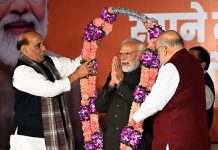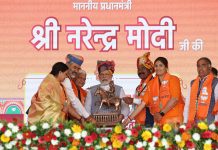When the 20-year-old Gurmehar Kaur tweeted, “I am not afraid of ABVP”, it was clear that Akhil Bharatiya Vidyarthi Parishad has begun wearing its peculiar brand of nationalism up on its sleeves. She went on “to anyone questioning my courage and bravery. I’ve shown more than enough”. Her tweets following violence at Delhi University’s Ramjas College went viral and received massive support from students across various universities.
Though subsequently, she withdrew from the campaign but she had made a point that intolerance and jingoism had crept in our system. “I’m withdrawing from the campaign. I request to be left alone. I said what I had to say…”. “I have been through a lot and this is all my 20 years self could take,” the student of Delhi’s Lady Sri Ram College said. Kaur, daughter of a Kargil martyr, had kicked off a social media campaign against the ABVP after Ramjas College witnessed large-scale violence.
The DU incident is line with the ABVP’s provocative attitude that was earlier witnessed in JNU(Jawaharlal Nehru University), Hyderabad University, IIT-Chennai, and other institutions of academic repute. There is a question mark whether it was a spontaneous reaction of ABVP or there was a method in the madness. The pattern shows that it was not the act of a group of youngsters with a brazen sense of nationalism better said as jingoism. The journey from JNU to DU showed a pattern with law enforcing agencies remaining a mute spectator, falling short of abetting.
In Ramjas incident, there is a question mark whether it was spontaneous reaction of ABVP or there was method in madness
The act was at a sniffing distance from gagging the free speech by the on the campus. It is apparent that the way police allowed an event to be disrupted at Ramjas College and the subsequent violence amounted to complete failure of the law enforcing force. As Delhi Police comes directly under the Union Home Ministry, the government cannot disown its responsibility.
The DU mayhem was just over an invite to JNU students Umar Khalid and Shehla Rashid to address a seminar on ‘Culture of Protests’. Umar Khalid had to speak in a session on “Unveiling the state: Regions in conflict, the war in Adivasi areas”, based on his research on Bastar belt. It was part of a programme cleared by the Delhi University college authorities. Khalid was invited by the college’s Literary Society to speak in the afternoon on a subject related to his PhD, which he is doing from JNU. Ironically, the college management later withdrew the seminar in the aftermath of opposition by the ABVP.
The whole saga would have perhaps remained under wraps but for the courageous girl student who posted a video on Facebook with placards, one of them saying: “I am a student of Delhi University. I am not afraid of ABVP. I am not alone. Every student of India is with me.” She then allegedly received rape and life threats on the social media by some who called her “anti-national”. To make hay, Delhi Chief Minister Arvind Kejriwal called on Lt. Governor Anil Baijal to demand action against the ABVP and those who issued rape threats to the Delhi University student. “Threatening our daughters and sisters with rape; is this patriotism? Shame on these people,” Kejriwal said.
 Resorting to violence to stop a seminar is a grave crime and this takes a more sinister dimension when it is perpetuated on the campus and assaults the young minds. It is not only an attack on an educational temple but on our fundamental rights enshrined in the Constitution.
Resorting to violence to stop a seminar is a grave crime and this takes a more sinister dimension when it is perpetuated on the campus and assaults the young minds. It is not only an attack on an educational temple but on our fundamental rights enshrined in the Constitution.
It was not mere objecting to the presence of a couple of invitees at the seminar but an attempt to silence those not falling in line with its ideology. The genesis of the whole issue is that both Umar Khalid and Shehla Rashid had worked in tandem with Kanhaiya Kumar early last year against attempts to criminalise dissent at the JNU. The JNU student leaders were booked by the Delhi Police.
The police cases of sedition filed last year in an ideological stand-off between the establishment and the left-leaning JNU fell like pins, the hysteria generated by the ABVP has remained. The scars of the incident have remained with the students. Educational institutions enjoy a mandate to promote public discourse, political parties and other outfits have not taken kindly to the debates, seminars and free flowing ideas that emanate from educational institutions over the years.Repeat incidents at the JNU, Hyderabad University, IIT-Chennai, and other institutions of academic repute are pointers to this growing intolerance.
Inaction on the part of law enforcing authorities would cause worry amongst student communities across campuses. There would always be a question mark over why the police dealt with the guilty with kid gloves? Was not it exactly on the lines as it had allowed activists to go on the rampage outside the Patiala House courts when Kanhaiya Kumar was to be produced for a hearing? The failure of Delhi University to take a stand in favour of its students would always hurt the psyche of students. There is a need for the authorities to ensure that Universities must remain sanctuaries where young minds can develop and be nurtured in an atmosphere that is free from violence and intimidation.
Universities are arenas for intellectual discussion where students learn the argumentative skills to defend and oppose. The father of Nation Mahatma Gandhi had aptly foreseen the present day scenario when he said that “anger and intolerance are the twin enemies of correct understanding”. It is the time all stake holders imbibe what Gandhi said and allow free and fair discussion and not attempt to gag free speech and expression.
letters@tehelka.com














